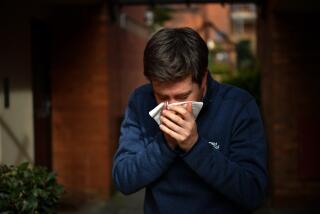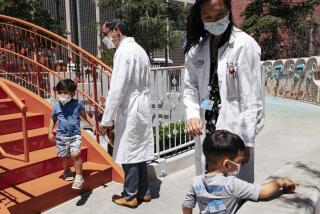Why do doctors, of all people, show up for work sick?
- Share via
Doctors and nurses understand that working while they’re sick can put their patients at risk.
But most do so anyway, a new survey of workers at the Children’s Hospital of Philadelphia suggests -- influenced by factors as varied as concerns over who will fill in for them, worries that their patients can’t get by without them and a widespread notion that healthcare workers who stay home to nurse a cold or stomach bug are somehow weak or unprofessional.
------------
FOR THE RECORD
An earlier version of this post identified the first author of the JAMA Pediatrics study as Julia Symczak. Her name is Julia Szymczak.
------------
“There is an unspoken understanding that you probably should be on your deathbed if you are calling in sick. It inconveniences my colleagues, is complicated to pay back shifts, and makes me look bad to do so (like I am weak or something),” wrote one attending emergency department physician who took the survey. “It is much, much less stressful to suck it up and come in sick than call out.”
The doctor’s comments and other survey results were compiled by researchers and clinicians affiliated with the hospital’s division of infectious diseases, and were published Monday in JAMA Pediatrics.
The group collected anonymous survey responses in early 2014 from 280 attending physicians and 256 “advanced practice clinicians,” including nurse practitioners, physician assistants, clinical nurse specialists, nurse anesthetists and nurse midwives.
The vast majority -- 95.3% -- said they believed that working while sick puts patients at risk, but 83.1% said that they had come to work with symptoms at least once in the past year. More than half of all surveyed reported doing so two to four times; nearly 10%, five or more times. Many (55.6%) said they would work with respiratory symptoms such as cough, congestion and sore throat; 30% said they would work if they were suffering diarrhea. Generally, doctors were more likely than the other healthcare workers to report they would work while ill.
When asked why they didn’t take sick days, more than 90% said that they were concerned about letting down colleagues or patients and that they feared the hospital would not have enough staff to care for patients. But nearly two-thirds also reported that they reported for duty because they were concerned about being ostracized by colleagues, or because others in the hospital work sick. More than half complained that hospital leadership was “not supportive of the sick leave policy,” and about the same number said that they weren’t fully clear what symptoms constituted being too sick to work.
“Working while sick was common,” wrote first author Julia Szymczak and colleagues. “Systemic, logistic and cultural factors combine to create a climate in which respondents perceived that they have no choice but to work while sick despite recognizing that this choice puts patients at risk.”
The co-authors called on healthcare systems to set up better backup systems, to tailor those systems to local needs, and to better define and communicate “the spectrum and severity of symptoms that should preclude a healthcare worker from working in a clinical setting.”
While necessary, it won’t be easy, wrote Dr. Jeffrey R. Starke of the Baylor College of Medicine and Dr. Mary Anne Jackson of the University of Missouri-Kansas City School of Medicine, in an editorial that accompanied the study.
“Determining what constitutes being too sick to work is complicated,” they wrote, citing difficulties hospitals have faced setting up work restrictions during flu season without creating severe staffing shortages.
They called on healthcare organizations to study that problem further, to work to decrease the stigma surrounding staying home and to set up workable systems to support sick leave policies.
Until then, complaints like the ones leveled by the doctors and other staff at Children’s Hospital of Philadelphia could persist -- as could sniffles and coughs in hospital corridors.
“Over the past few years, our hospital has increasingly become a place where everyone is expected to work at peak capacity at all times, and there is minimum redundancy or give to accommodate acute illness,” wrote one pediatrician who took the survey.
“As such, we all feel pressured to deny our own needs (often giving up meals, bathroom breaks, and, yes, caring for our own illnesses) in order to continue to meet the high pressure/high demand/productivity expectations of the health care system.”
For more on science and health, follow me on Twitter: @LATerynbrown







